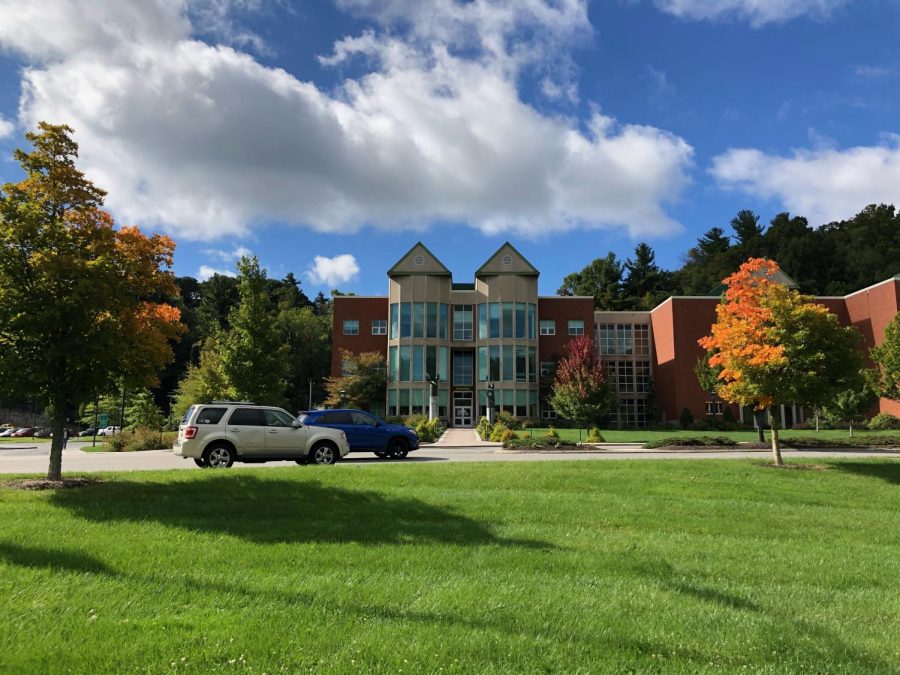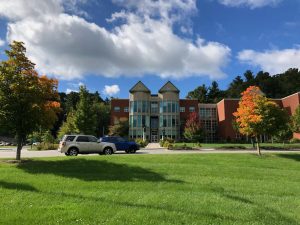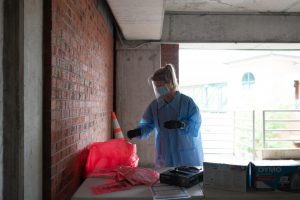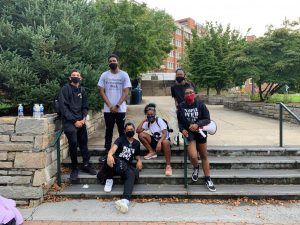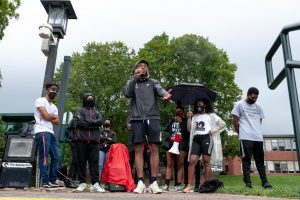Black ambassadors strike due to university response to COVID-19, Black at App State Collective
The John E. Thomas Building, where the Appalachian Student Ambassadors’ main meeting spot for tours is located.
October 5, 2020
Frustration about the university’s response to COVID-19 and demands from the Black at App State Collective has led Black Appalachian Student Ambassadors to refrain from giving campus tours.
“What we need is reform,” said Zane Johnson, who has been an ambassador for three years. “Not just in the organization, but in the university itself. If we’re representing the university, we have to agree with what the university does, and I don’t agree with what the university does in response to COVID-19, Black at App State demands.”
Ambassadors are student volunteers who give tours of the university and work closely with the Office of Admissions, the Alumni Association and the Office of the Chancellor to host open houses and various on-campus events.
“I just don’t feel comfortable speaking highly or positively on the university that I don’t feel safe in currently,” said Johnson.
Black at App State is a group that gained traction this summer when it wrote a list of demands to university administration, including Chancellor Sheri Everts, calling for actions like a bias incident reporting system and more support resources for Black students.
“The Black Ambassadors, as a collective, are choosing to stand in solidarity with Black At App State until further notice. I think it is only right that we do this because this is something bigger than ourselves,” said Thelma Vambe, one of the ambassadors refraining from giving tours.
Vambe says she hopes the administration and App State community listen to and meet Black at App State’s demands.
“I want to thank each one of them for having the courage to be the voice for the Black students on this campus. The demands they implemented are things that the university should have been doing,” she said.
The group has already begun conversations with its executive committee and advisers in the alumni and admissions offices.
Sarah Garrow is the associate director of alumni affairs. She says her office has met with two of the ambassadors on strike, and shared its progress on office-wide action steps towards inclusion.
The action steps include things like staff members in Garrow’s office completing “measurable performance goals related to diversity and inclusion training opportunities to promote personal and professional growth” and continuing to work alongside and collaborate with leaders in the African American Alumni Network, she wrote in an email.
“As educators and supporters of our students, alumni and university, we will continue to evaluate our daily work as an opportunity to support an inclusive environment for all Mountaineers,” Garrow said.
Megan Hayes, spokesperson for App State, said that Chancellor Sheri Everts charged University Communications and Enrollment Management with reconstructing in-person tours to include more diverse viewpoints.
“The Office of Alumni Affairs and Office of Admissions, which together oversee the Ambassador program, will continue engaging with our student Ambassadors in ongoing dialogue about national issues – in particular racial justice and the COVID-19 pandemic – and the many impacts they have on our campus,” Hayes wrote in an email.
Sarah Bailey, president of the organization, says her executive committee was initially concerned with how to better the organization and take responsibility for the things that made her fellow ambassadors feel “unheard and unsupported.”
“Our number one priority was, and is, the health and safety of our members,” Bailey wrote in an email, “so we wanted to make sure we were connecting these five members with the proper lines of communication to the three offices we serve to have the conversations necessary to allow them to feel comfortable rejoining our group, and ultimately creating lasting change for current and future Ambassadors.”
Johnson says the advisers and members of the executive committee have been responsive so far, and regularly update him and the other ambassadors about changes taking place. One change has already been implemented: requiring ambassadors to speak about diversity and inclusion during tours.
Johnson says that at most other schools, tour guides are given a script. At App State, ambassadors are given an outline, but allowed to make the tours their own. In the last several years, the diversity and inclusion segment of tours has been optional. Now, it’s required.
“You wouldn’t make the cost of tuition optional … that’s like a staple, and so should the diversity and inclusion,” Johnson said.
Vambe says she hopes that the group’s boycott will demonstrate that they don’t feel safe giving tours at this time.
“With everything going on in this nation, at some point, one must understand and see that enough is enough. It is time for a change, in fact, it has been time,” Vambe said.
Bailey says the organization is actively working to create a more equitable environment for Black Ambassadors and future members and increase transparency between the executive committee, offices the group serves, and ambassadors themselves.
“There is much to be done, and in doing so our goals remain to protect our members, and maintain their health and safety – especially during this time,” she said. “We can only accomplish the goals of our mission statement if all our members feel supported, and that is what we will continue to work toward.”
Johnson says he isn’t boycotting because he dislikes his organization, but because he cares about it.
“I’m not sitting here trying to talk negatively on our organization, I just want it to be better, that’s all,” he said. “I feel like there’s room for improvement everywhere.”

